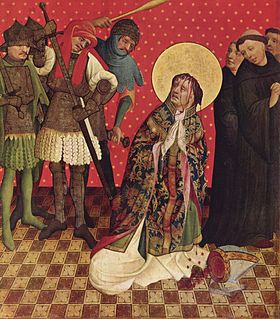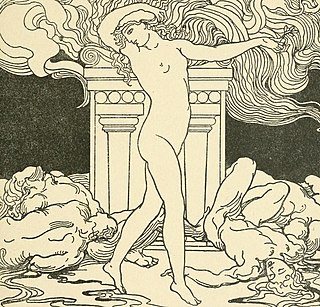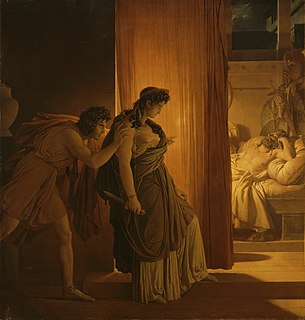
Gino Vanelli was an Italian operatic baritone who had an active international career from 1917 until his retirement in 1955. He made several recordings for HMV and Columbia Records, including complete recordings of the operas La boheme, Pagliacci, and Madama Butterfly.

Ildebrando Pizzetti was an Italian composer of classical music, musicologist, and music critic.
Gerard or Gherardo or GherardinoSegarelli or Segalelli was the founder of the Apostolic Brethren. He was burned at the stake in 1300.

La finta giardiniera, K. 196, is an Italian-language opera by Wolfgang Amadeus Mozart. Mozart wrote it in Munich in January 1775 when he was 18 years old and it received its first performance on 13 January at the Salvatortheater in Munich. There is debate over the authorship of the libretto, written for Anfossi's opera the year before. It is often ascribed to Calzabigi, but some musicologists now attribute it to Giuseppe Petrosellini, though again it is questioned whether it is in the latter's style.

Cesare Valletti was an Italian operatic tenor, one of the leading tenore di grazia of the postwar era. He was much admired for his polished vocal technique, his musical refinement and elegance, and beauty of tone.

La figlia di Iorio, sometimes written as La figlia di Jorio, is an opera in three acts by Alberto Franchetti to a libretto by Gabriele D'Annunzio. The libretto is a very close rendering of D'Annunzio's play of the same name. La figlia di Iorio premiered at La Scala on 29 March 1906, conducted by Leopoldo Mugnone. Although the play, which had premiered two years earlier, was considered one of D'Annunzio's greatest works, the opera did not achieve a comparable success and has been rarely performed since its day.
Nino Sanzogno was an Italian conductor and composer.

Assassinio nella cattedrale is an opera in two acts and an intermezzo by the Italian composer Ildebrando Pizzetti. The libretto is an adaptation by the composer of an Italian translation of T. S. Eliot's 1935 play Murder in the Cathedral. The opera was first performed at La Scala, Milan, on 1 March 1958. The opera was performed for the first time in Canada the following year at the Montreal Festivals.

Dèbora e Jaéle is an opera in three acts composed by Ildebrando Pizzetti who also wrote the libretto. The libretto is based on the story of Deborah and Jael from the Book of Judges in the Bible. However, it differs in several ways from the traditional Biblical account, primarily in the motivations of its characters and the relationships between them. The opera was first performed at La Scala, Milan on 16 December 1922.

Il re is a novella or opera in one act and three scenes by composer Umberto Giordano to an Italian libretto by Giovacchino Forzano. The opera premiered at La Scala in Milan on 12 January 1929.
Guido Turchi was an Italian composer and writer on music.

Zanetto is an opera in one act by Pietro Mascagni to an Italian libretto by Giovanni Targioni-Tozzetti and Guido Menasci. It received its first performance on 2 March 1896 at the Liceo Musicale Rossini in Pesaro. Only 40 minutes long and with cast of two singers, Zanetto was originally described by its composer as a scena lirica rather than an opera. It is set in the countryside near Florence during the Renaissance and tells the story of an encounter between a beautiful courtesan, Silvia, and a young wandering minstrel, Zanetto. The libretto was adapted from an Italian translation by Emilio Praga of François Coppée's play Le passant in which the young Sarah Bernhardt had won fame in the en travesti role of Zanetto.
Bernadette Manca di Nissa is an Italian operatic contralto who has sung leading roles in the principal opera houses of Italy as well as internationally. She has appeared at La Scala in Milan, La Fenice in Venice, Teatro San Carlo in Naples, and the Maggio Musicale Fiorentino in Florence as well as at the Royal Opera House, Covent Garden, Gran Teatre del Liceu in Barcelona, Lyric Opera of Chicago, Festival of Salzburg, Matsumoto Festival, NHK in Tokyo, Sao Carlos Theater in Lisboa etc.

Lo straniero is an opera in two acts composed by Ildebrando Pizzetti who also wrote the libretto. Based on characters from the Old Testament but with an invented story, it is the third work in Pizzetti's trilogy on the themes of redemption and the virtue of love. Although it did not receive its premiere until 1930, Pizzetti had begun the project several years earlier. He began the libretto in 1922 and completed it in 1923. The composition of the music was completed in 1925. The other two works in the trilogy are Dèbora e Jaéle which premiered in 1922 and Fra Gherardo which premiered in 1928.

Giacomo Vaghi was an Italian opera singer who had an active international career from 1925-1956. Along with Tancredi Pasero and Ezio Pinza, he was one of the leading operatic basses of his generation. He possessed a rich voice with a dark timbre that drew him particular acclaim in the operas of Giuseppe Verdi. He appears on several complete opera recordings made with EMI Classics and Cetra Records.

Rito Selvaggi was an Italian composer, pianist, conductor, poet, and educator. He composed numerous works, including operas, oratorios and sacred music as well symphonic and chamber music. He also served as the Director of the music conservatories in Palermo, Parma, and Pesaro.

Aldo Bertocci was an Italian operatic tenor who sang both comprimario and leading roles in a career spanning the late 1940s to the mid-1970s. He sang in the world premieres of nine 20th century operas, most of them in performances broadcast on the RAI, Italy's national public-service radio. His discography includes live recordings of several rarities such as Mascagni's Silvano and Leoncavallo's Zingari. Bertocci was born in Turin and from 1974 lived in Cassano Valcuvia where he died shortly before his 88th birthday.

Fedra is an opera in three acts composed by Ildebrando Pizzetti to an Italian-language libretto which he abridged from the text of Gabriele D'Annunzio's 1909 tragedy of the same name. The play and the opera recount the story of the Greek mythological figure Phaedra and her unrequited love for her stepson Hippolytus. It premiered on 20 March 1915 at La Scala in Milan conducted by Gino Marinuzzi.

Clitennestra is an opera in a prelude and two acts, was the last work by Ildebrando Pizzetti. The libretto is in Italian language. The opera play is based from ancient Greek mythology written by Aeschylus and Sophocles. It premiered at La Scala in Milan on 1 March 1965, conducted by Gianandrea Gavazzeni.
Gherardo is a given name. Notable people with the name include:














